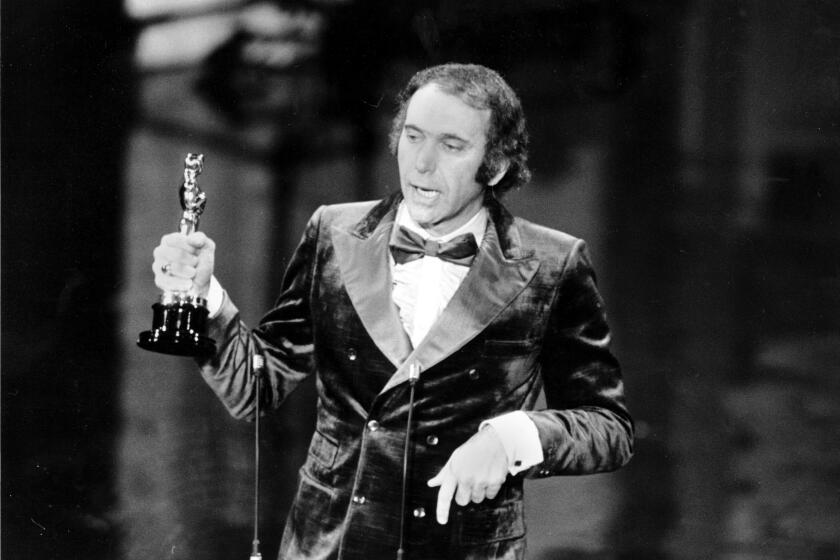Oscars Have No Hidden ‘Agenda’ to Thwart Popular Documentaries
As a member of the Academy of Motion Picture Arts and Sciences’ documentary nominating committee for the past two years, I am infuriated by the whining that has taken place since this year’s best documentary nominees were announced, and in responding to it, I speak for myself and not for either the committee or the academy.
Robert Epstein, in his Calendar column “Academy’s Latest Film Stir-Fry” (March 12), correctly noted that more passions were “generated over who and what were left out than who and what got in.” And an earlier Calendar story by Diane Haithman (“And the Nominees Aren’t . . . Documentaries That Oscar Forgot,” Feb. 21) focused on the “anger” and “disappointment” of documentarians who did not receive nominations.
Haithman’s piece particularly quoted the gripes of Michael Apted and Jennie Livingston. Both of them have every right to think that their respective documentaries are better than the five films that were nominated, just as reviewer Gene Siskel has a right to the opinions he expressed in Haithman’s story.
Where Siskel, Apted and Livingston are way out of line--and offensively so--is when they preposterously attribute to the nominating committee a sort of hidden “agenda” to shut out all commercially and critically “popular” films. What an absurdity!
The fact is that committee members vote as individuals, individually grading each screened submission in a secret ballot.
Never have I encountered a group of professional people so professionally dedicated to a professional task: the selection of the documentary nominees. I stress the word “professional,” for that’s what they are, experienced and knowledgeable professionals--about 50 of them--successful film producers, writers, directors, editors, actors, as well as documentarians. They are thoughtful, caring people of integrity who try to maintain the highest standards and who have the professional ability to impartially judge not only the content but the execution of submitted works.
And they are totally impervious to hype or to what a Gene Siskel might or might not say about a film. They are professional film people and they make professional evaluations. Sometimes they may even agree with the Siskels. And if not, not. They are singularly charged with the responsibility of coming up with the five best-made documentaries--not to confirm or rubber stamp the pronouncements of the press.
That the documentary committee encompasses many creative disciplines is entirely consistent with the way the academy nominees for best picture and best foreign picture are selected. A fairly large, informed cross-section of voters is probably fairer, in that categorical competition, jealousy, enmity and friendship--both hypocritical and real--cannot count for as much as they might.
It is untrue that there is a bias against films that have played on television, as some of those quoted in the Calendar articles suggested. Three of the five nominated films had appeared on television.
Most shameful are the sore-losing whines of Apted and Livingston, accusing the committee of prejudice against critically and commercially successful films. I’m glad their films are making money.
I hope that the two Oscar-nominated theatrical documentaries that have just opened to critical acclaim will do as well. I think they might, unless they are hurt by the adverse publicity attendant to the belittling, demeaning and dishonorable damnation wreaked upon them by Apted, Livingston and others.
Their unseemly complaints insult not only the reputable members of the committee but, much more hurtfully, the five nominees whose films were declared better than theirs. How dare they spoil the pleasure and rightful satisfaction of those nominated.
There are only two reasons an eligible documentary is not nominated. Either its screening is terminated before its conclusion because it is not deemed worthy of further consideration, or, in varying degrees, it is not as good as the five that are eventually nominated.
In Haithman’s article, Apted said he planned to organize as many documentary filmmakers as possible to “demand” changes in the academy’s nominating procedures. Well, evidently he has done so, enlisting the support of all the now well-known, highly publicized academy nomination rejects.
The following is but a small sampling of documentary features the academy has nominated and sometimes given Oscars to in the past. It renders all whining complaints rather ridiculous and the academy’s possible submission to this outrageous pressure an unthinkable disgrace:
Barbara Kopple’s “Harlan County, U.S.A.” and “American Dream,” Marcel Ophuls’ “The Sorrow and the Pity,” John Korty’s “Who Are the DeBolts,” “Scared Straight,” “Woodstock,” Peter Davis’ “Hearts and Minds,” “The Times of Harvey Milk,” “From Mao to Mozart: Isaac Stern in China,” “He Makes Me Feel Like Dancing,” “Berkeley in the Sixties,” “Eyes on the Prize” and “Common Threads: Stories From the Quilt.”
More to Read
Only good movies
Get the Indie Focus newsletter, Mark Olsen's weekly guide to the world of cinema.
You may occasionally receive promotional content from the Los Angeles Times.






